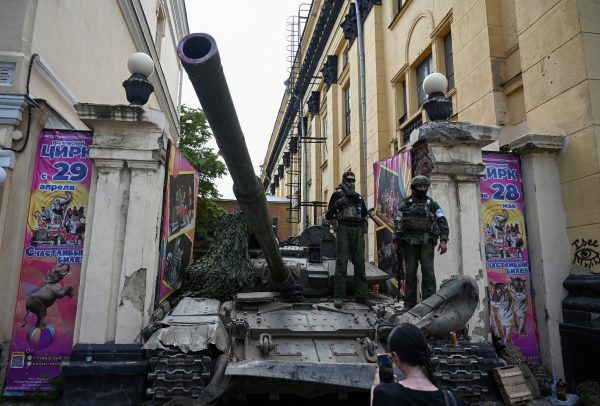Before the dust settled, Western media and policymakers were quick to hail the weakening of Putin’s grip on power, which is anticipated to not only weaken Russia’s fighting capacity in Ukraine but also undermine Moscow’s relationships with its Asian partners, particularly China. This is due to uncertainty surrounding Russia’s foreign policy orientation in case of a regime change.
The inference that drives this narrative is clear. Whether Prigozhin wanted to topple Putin or simply attract attention to the failures of the Russian military top brass in Ukraine, heavily armed mercenaries boldly occupying Russia’s major cities without Putin’s permission is an outrageously defiant act. It is indicative of deep cracks in what appeared to be a rock-solid political regime.
Against the backdrop of Russia’s stalling operations in Ukraine, the Wagner mutiny became a subject of darkly-humoured jokes on Russian social media, such as ‘[Russia] wanted to take Kyiv within three days but ended up conquering Moscow’.
When an autocrat’s grip on power weakens, regime stability is called into question, which makes the country’s strategic allies and partners reassess the relationship with the regime and even start hedging their economic and security bets affected by that relationship. For example, China was reportedly re-evaluating its partnership with Moscow and being ‘more cautious with its words and actions about Russia’. Beijing and other partners do not want to invest political and economic capital in a relationship with a regime that may fall or be replaced by one which might turn against them.
But another equally coherent story is likely to prevail among Russia’s non-Western allies, namely, that Putin has successfully proved to elites and foreign partners that he can handle challenges to his regime in a way that very few authoritarian leaders in a similar situation would have.
Due to the lack of competitive elections, authoritarian regimes occasionally face collusions, mutinies, rebellions and coups d’état, often involving violence. In this context, authoritarian leaders’ legitimacy and their right to rule is based on their capacity to suppress, prevent or mitigate these challenges and silence or remove the initiators.
From this standpoint, Putin performed exceptionally well — he managed to stop Russia’s most effective fighting force without actual fighting, a nationwide state of emergency or external support. He somehow found a way to compel the Wagner Group to dissolve, with its boss allegedly leaving for Belarus, Russia’s stalwart ally.
Not every authoritarian leader can boast this level of effectiveness. Kazakhstan President Kassym-Jomart Tokayev had to appeal to the Collective Security Treaty Organization, of which Kazakhstan is a member, to request security assistance when his power was challenged by what is now known as the 2022 Kazakh unrest. Hundreds of people died in the protests before political stability was restored.
Similarly, when on 15 July 2016, a faction within the Turkish Armed Forces, organised as the Peace at Home Council, attempted a coup d’etat against the government and Turkish President Recep Tayyip Erdogan, a state of emergency was declared. More than 300 people were killed before Erdogan’s grip on power was reinstated.
Considering that Russia is at war with Ukraine — a war which many in Russia view as illegitimate — Putin’s nonviolent handling of the Wagner incident appears as nothing less than political magic. It is seen as proof of Putin’s effectiveness as a leader.
This perspective is evident in the reactions of some South American leaders to the events in Russia. Venezuela President Nicolas Maduro announced that the Russian leader, having effectively blocked the rebellion attempt, came out as a winner. Similarly encouraging wishes were sent to Putin by his Cuban counterpart, President Miguel Diaz-Canel, who stated that Cubans had no doubts about Putin’s capacity to handle the challenge.
Russia’s largest Asian partner, China, formally expressed support for Putin and praised the future of China–Russia relations. Beijing has also developed a narrative that glorifies Putin’s effectiveness as a leader and dismisses the notion that the Wagner mutiny undermined Putin’s standing. China’s state-run tabloids have praised Putin’s ‘decisive actions’ and the Kremlin’s ‘strong capacity of deterrence, which will further increase its authority’.
Nor did India shift its position on Russia, continuing to consider its relations with Moscow as ‘steady despite all the conflict in the world’. At the Shanghai Cooperation Organisation summit on 4 July 2023, Putin had a chance further to reassure Asian nations of stability after the Wagner mutiny.
Judging by the outcomes of the Shanghai Cooperation Organisation summit, the consolidating narrative within the non-West and the current state of Russia’s relations with its allies, the failed Wagner mutiny is unlikely to have a detrimental effect on Russia’s standing in Asia.
Alexander Korolev is Senior Lecturer in Politics and International Relations at the University of New South Wales, Sydney.

